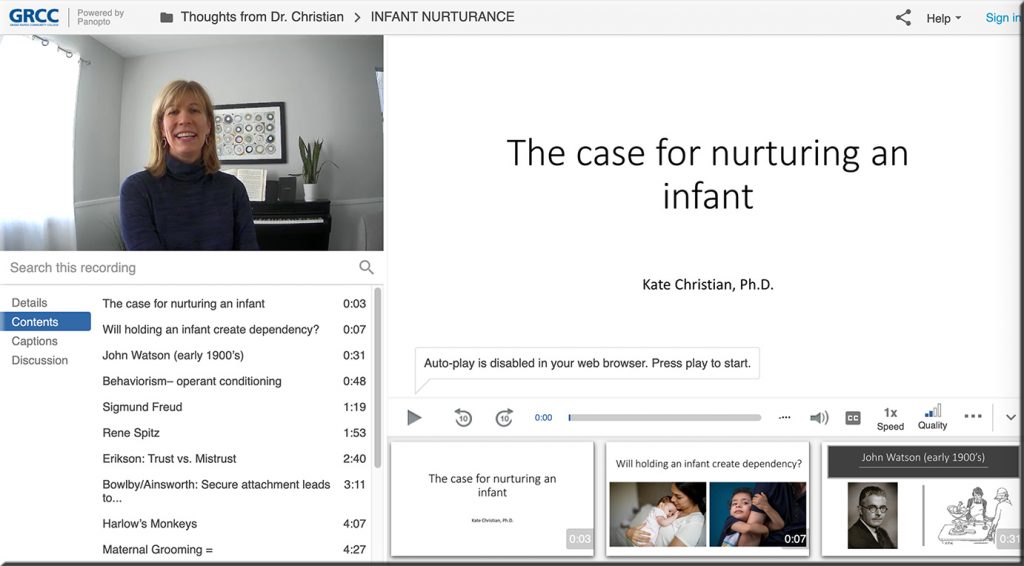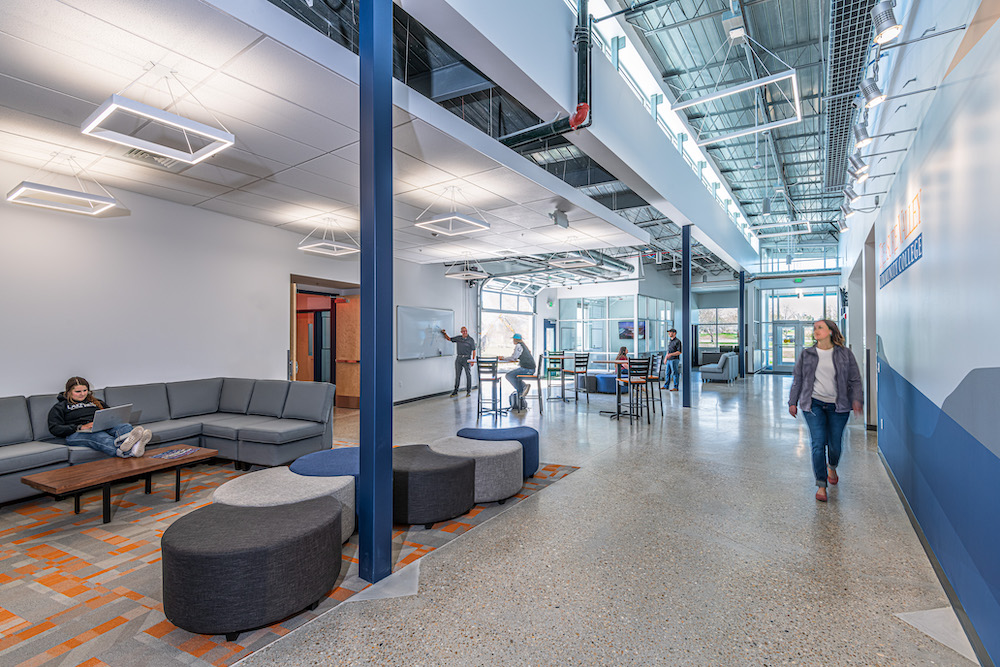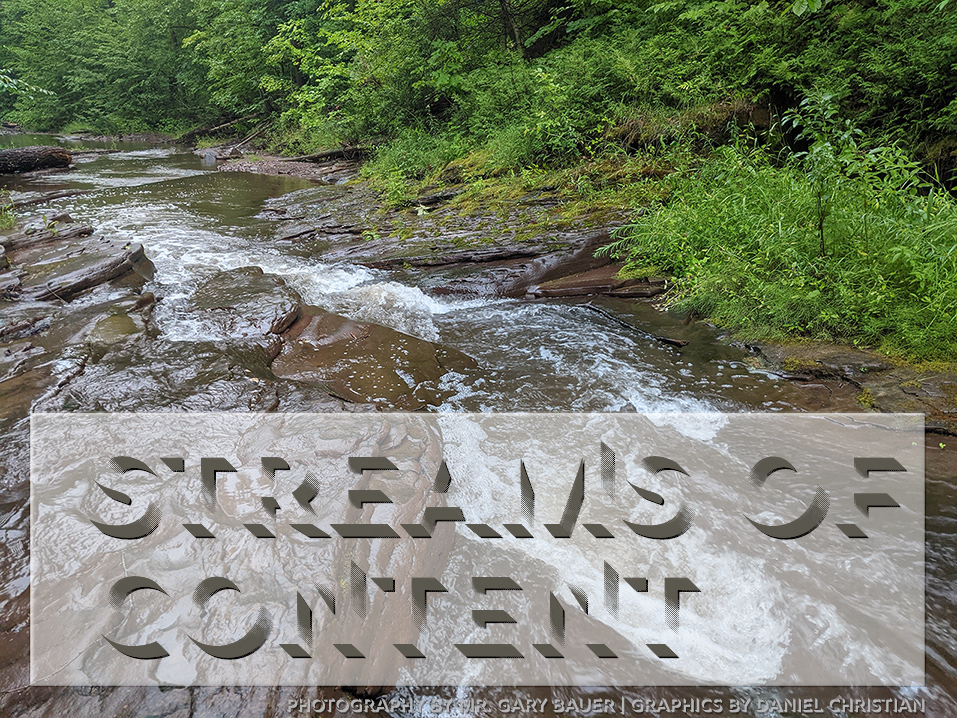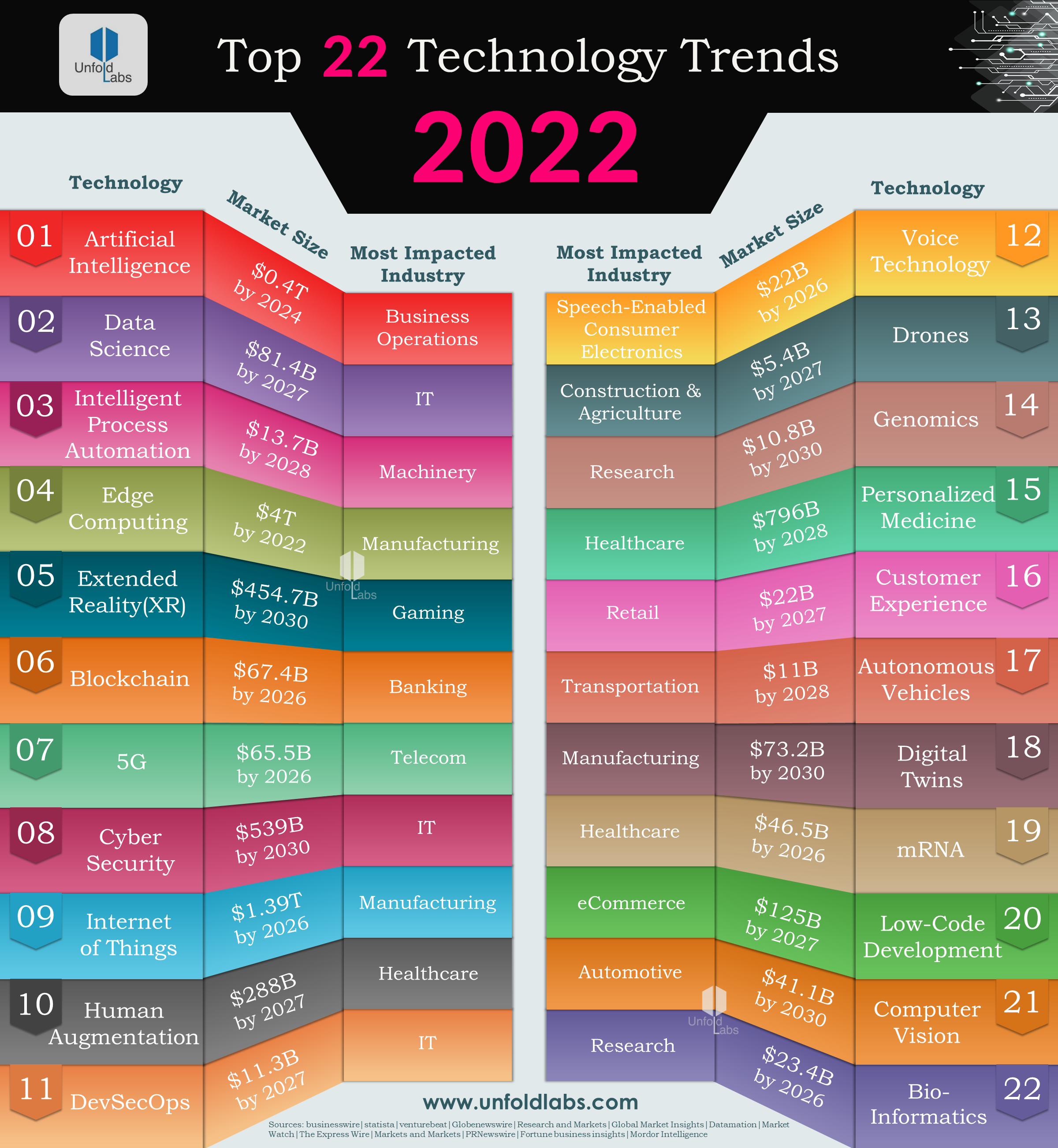
The case for nurturing an infant — from grcc.hosted.panopto.com by Dr. Kate Christian
Yes, Kate is one of my wonderful, talented, intelligent, and compassionate sisters! She is a Professor of Psychology at the Grand Rapids Community College.
Notes:
TITLE/THEME: The relationship between infant nurturance and the developing brain, and implications for long term physical and mental health
Question: How much time should you spend in direct interaction with your infant?
- CONCERNS: Many people are concerned that paying too much attention to an infant will have negative consequences. (Words like “spoiled”, “dependent”, “mama’s boy”, etc.)
- John Watson (1878-1958) wrote “The Psychological Care of Infant and Child” in 1928, arguing that infants and children should be treated like young adults, and that too much love and affection were damaging—children should not be kissed, hugged, or touched. Ideas such as strict feeding schedules (withholding nourishment if not on schedule) for infants were not uncommon during the first half of the twentieth century.
- Behaviorist views emphasize rewards and punishment in shaping behavior. Today few behaviorists would argue for limiting affection. However, some may argue to let an infant “cry it out”, citing research that indicates infants can learn to self-soothe by about 7 months.
- HOWEVER, a wealth of evidence (theoretical, observations, animal studies, and neuroscience research) shows that nurturing an infant provides long term physical and mental health benefits.
- PSYCHOANALYTIC theory:
- Sigmund Freud (1836-1959) coined the term “schizophrenogenic mothers”, claiming that especially for male infants, a failure of attachment to the mother could lead to schizophrenia, and that the mother’s lack of sensitive, caring behavior was the cause of attachment failure.
- Erik Erikson (1902-1994) established the idea of a psychosocial “crisis” during infancy in which the infant either learns to develop a sense of trust in the world (due to sensitive caregiving) or mistrust (due to unreliable, unpredictable or abusive care).
- John Bowlby (1907-1990) is the founder of Attachment Theory, which maintains that caregiving in the first year of life sets up an unconscious, internal working model of relationships that shapes behavior and thoughts later in life. (Mary Ainsworth (1913-1999) came up with a measurement tool.) Secure attachment develops from sensitive, responsive caregiving, according to Ainsworth and Bowlby.Support for attachment theory varies, and many developmental psychologists today believe that early attachment is moderately predictive of later outcomes. (Things like divorce or death of a parent change the internal working model, or therapy, etc.) But infants with a secure attachment are more likely to explore their environment and be INDEPENDENT!!
- OBSERVATIONS: Rene Spitz (1887-1974) compared infants raised in orphanages to infants whose mothers were with them but in prison (in the 1940’s), the primary difference being maternal vs. professional nurse care. When the infants were first placed in the orphanage, Spitz found that for the 1st two months of separation, the infant would weep, scream, and/or be unapproachable. After 3 months, the infant would often become listless, lethargic, and demonstrated bizarre finger movements, and couldn’t sit or talk. 38% of the infants in the orphanage developed marasmus and died within 2 years, whereas all of the infants raised in prison with their moms were alive at follow up (age 5). You can see video Click Here of infants who appeared dull and listless, or engaged in rocking back and forth or beating their heads on the crib. The infants were well fed and diapers changed, etc, but they had negligible physical touch or affection.Infants in institutions are less likely to play and interact with toys in the environment: Click here for video examples
.
- ANIMAL STUDIES:
-
- Rat pups The amount of licking given to rat pups by maternal dams has predicted the level of anxiousness (vs. relaxation) in the rat, as well as inhibitory (vs. exploratory) behavior on a maze. Research has shown there are changes in neurobiology (such as hormones and brain receptors in the amygdala) that impact how the rats react to stress. In other words, the more the mother rat licks/grooms the pup, the more she sets up that rat to stay calm and resilient in the face of stress, and to feel confident to explore the environment. nih.gov
- Harlow’s monkeys Monkeys in Harry Harlow’s experiment chose to spend nearly 23 hours a day in close contact with an artificial monkey that was covered in soft cloth and had big eyes (vs. a wire mother than administered food and drink).
- Rhesus monkeys: Neuroscientists have found changes in the basic architecture of the amygdala and areas in the limbic system among rhesus monkeys deprived of touch, eye contact, and adult nurturing during infancy. (p. 129 Marian Diamond, Ph.D.)
- NEUROSCIENCE:
- Face-to-face interaction between infant and caregiver help wire the infant brain (use-dependent) and set up the basic architecture of the brain. Infants who experience positive interactions have a neurophysiological response (being smiled at calms the brain!) and neural connections that interact with biological hormones and systems regarding stress regulation get established in a positive way. This leads the infant to grow up better able to handle stress and adversity.
Research using the ACE scale (adverse childhood experiences) found that children who face a great deal of adversity but are in relationally healthy, nurturing environments will show few long term negative effects (and the reverse is true—a child with even one ACE in an emotionally deprived environment will show significant poor outcomes). (From Bruce Perry lecture)
This infant nurturance also shapes the brain’s reward centers. Dr. Bruce Perry argues that infants deprived of nurturance grow up to feel dysregulated, and seek rewards in unhealthy behaviors (overeating/poor diet, substance use, thrill seeking, etc.)
-
- Example: kangaroo care is the practice of holding an infant skin to skin, and it has been shown to increase weight gain among premature infants.
- What about CELL PHONES?
- Using a cell phone while caring for an infant has been shown to increase the risk of infant injury by 10%.
- It also interferes with the face-to-face interaction needed for the neurobiological positive effects to occur!!
- Again… how much time to spend in direct interaction with an infant?
- It doesn’t have to be 24/7, but most infants are not getting enough time. (Hunter gather—spend nearly all day in close proximity to adults, infant child care centers, 4:1 ratio)
- Hold, sign, rock, touch, play together!
- But can’t you overdo it? Are you SURE you won’t spoil the infant or make him/her dependent?
- There is virtually NO evidence to suggest that “too much” attention in the first year of life is harmful. (Again, you don’t have to spend every minute together… both you and the infant need breaks!) But this cultural perception that it is possible to “over nurture” an infant has got to change!!
- What about Co-Sleeping?
- Worldwide, some form of co-sleeping is the norm.
- A study found that in the U.S., infants who co-sleep grow up to be MORE independent (secure attachment) than those who don’t.
- However, there are physical concerns, such as studies finding higher SIDS rates among infants who co-sleep. Also, if a parent is a deep sleeper, is drunk, or sleeps in a chair, if space between wall, etc, these are hazards.
BOTTOM LINE…. HOLD THAT BABY!!!












